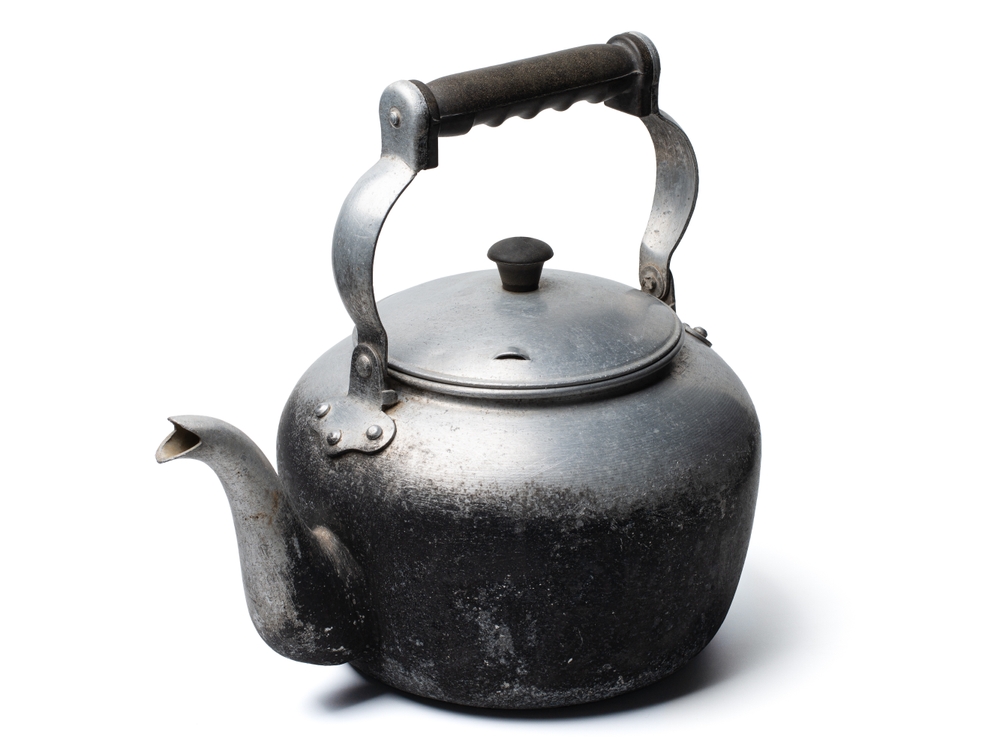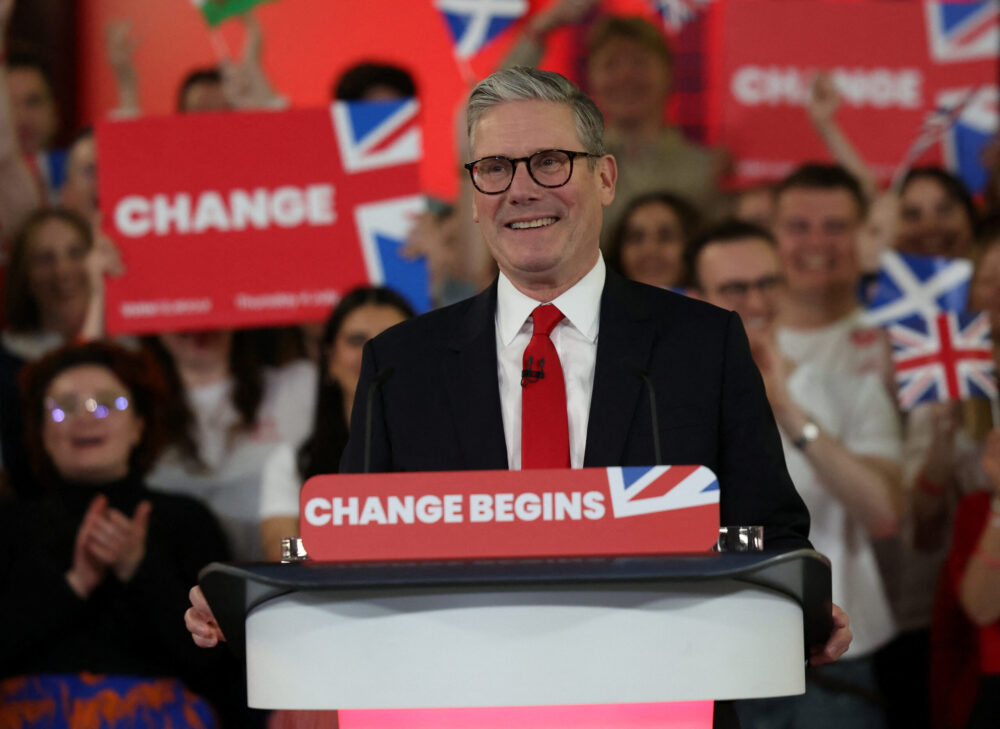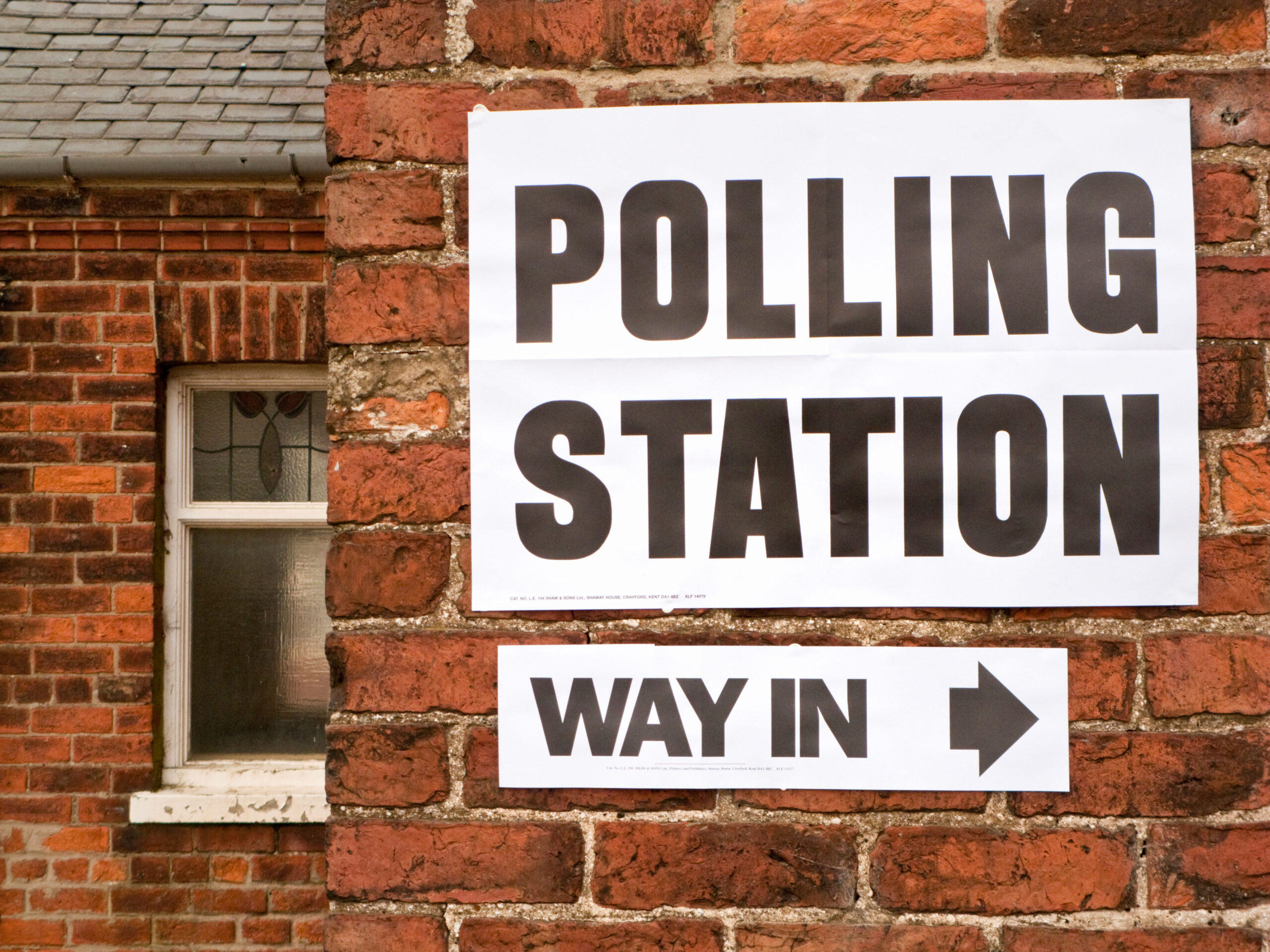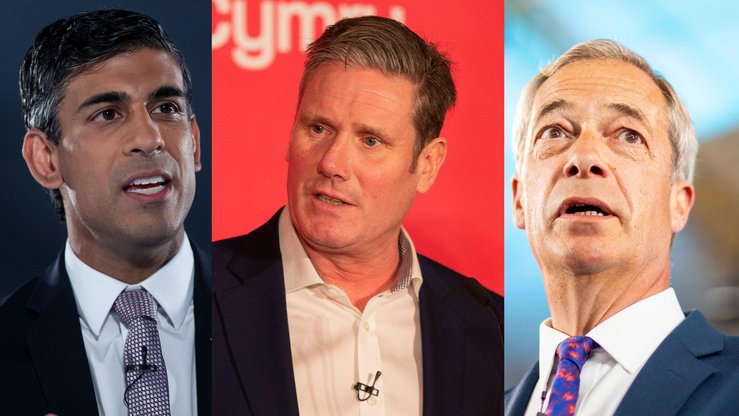
Our latest campaign focus groups took place on opposite edges of London: Uxbridge & South Ruislip, which Labour failed to take in last summer’s by-election but would hope to win comfortably given recent polling, and Bexleyheath & Crayford, where victory would point to national landslide territory. Participants had voted Conservative in 2019 but put their chances of doing so again at no more than 5 out of 10 – the kind of people the Tories will need to win back to shore up their position.
What had they noticed from the first week of campaigning? “National service;” “VAT on private schools;” “The quadruple lock on pensions;” “Ed Davey fell off a surfboard;” “Rishi made another gaffe about football;” “Labour say they will have sorted the NHS within 18 months;” “Nigel has perked up again;” “Labour want to reduce the voting age to 16;” “There are some issues with Diane Abbott;” “Something came up about mental wellbeing in schools. I quite liked it but I can’t remember which party it was.” Not everyone was yet enthused by the election: “I kind of feel it’s like going through the motions. I can’t really get into it. It’s not really a race. Everyone knows what’s going to happen.”
The reaction will be ‘how am I going to get out of it’?
The Tory plan for national service received mixed reviews: “It would put a discipline in people because they don’t have that anymore;” “It’s one weekend a month. Everyone could play their part and get involved. No-one’s going to be sent to the front line to die;” “Maybe they should make it more for kids in juvie who really need it. We had kids come in the shop who used to be really badly behaved but go to the army, and when they come back they’re completely different, well-mannered and show you the respect. And the skills they gain will be amazing.”
Some saw the idea as a form of conscription and worried about the military implications: “It’s scary to be honest. Last time that was happening it was World War Two;” “A country like the UK should have a big enough army. They shouldn’t need to force people into it;” “They might not be on the front line but that’s the way it’s come out. The devil’s in the detail, isn’t it?” “People over 50 are the ones calling for it because it’s not affecting them, but they want their grandchildren to go.” Several had their doubts about the practicalities: “I don’t know how they can enforce it. And I think parents are quite wishy-washy as well. They’ll be looking for the thing to get them out;” “It’s not realistic, is it? English young people are not like young people from Poland. They’ve been given all these rights. My daughter said, ‘I won’t have to go because I’m disabled’. She’s got epilepsy. That’s the instant reaction, ‘how am I going to get out of it’?” “Maybe that’s why we need it!”
It feels like another attack on middle England
None of our participants had children at independent schools, but Labour’s plan to charge VAT on fees was strikingly unpopular in these groups. Many worried that it would put more pressure on local state schools, was an attack on aspirational parents who made sacrifices to afford fees, and would put private education beyond the reach of all but the very rich: “Where’s it going to push those kids? It’s like private medical care, taking pressure off the NHS. Where do those kids go?” “My children go to a state school, but it feels like another attack on middle England. It feels like those of us who are in that middle bracket seem to come off worst out of everything. This is another insult to people;” “I know a black cabbie who works all the hours under the sun to send his two kids to private school, and they’re the ones who are going to lose out, not the rich people;” “Maybe they don’t have good schools near them, or they’ve got no choice. Or they didn’t get into the good schools, which is another problem in this borough.”
Labour’s plan for votes at 16 was hardly more popular in our groups. “It’s a bad idea. I work with young people;” “It would be Meta voting. They’re on social media all the time, so they can push things through and manipulate them;” “They get their facts from TikTok;” “Once you come out of school and go into the real world you can make your own mind up;” “The 18 to 24s are the biggest non-voters anyway. Why add another two years to that?” There were a couple of takers for the policy, however: “It would be unfair to be 17 and not allowed to vote and then called up for national service a year later;” “It might start to invoke some thought process. Make them take some responsibility and start having a vested interest in the vote.”
He’s a ditherer through and through
All the groups had noticed the row over whether Diane Abbott would be allowed to stand again as a Labour candidate: “They took the whip away from her and then gave it back to her and then said she can’t stand as an MP;” “They don’t want to keep her around. They were trying to get her out because she’s a Corbynite;” “He wants to give her a nice send-off, but they don’t want to say anything because of the antisemitism stuff. She took a course on it. I think they’ve handled it quite badly;” “It looks a bit messy in the Labour party.”
Participants noted that the row seemed typical of Keir Starmer’s approach to such controversies: “They try and see how the public perceives them, and once they kind of settle what their opinions are, then they make a decision. Dip their toe in the water and see how everyone’s feeling;” “He’s a ditherer through and through. He says he’s going to do something and then it’s ‘actually we can’t do that’.”
Some felt the episode offered a glimpse of further disagreements: “You wonder if this is just an example of deep divisions within the Labour party that are just coming to the surface. It’s perhaps one of the ways in which Labour might to do as well as they expect.”
It’s gone on so long they can’t blame anyone else
Our 2019 Tories were scathing about the government’s record. “The safety of our country, in terms of two-tier policing, especially with what’s going on at the moment. Nobody seems to give a f*** about the Jews. They just let people get beaten up. I don’t feel safe because of that;” “There’s been a huge rise in knife crime;” “Things are falling apart. The roads are crap, they’re not investing in anything;” “We always have to be seen to be giving money to whatever crisis du jour there is in the world, but we’re in the worst situation. When everything went nuts Germany’s energy bills went up by 20% or whatever and ours went up by a hundred and something. So it’s like, why?” “There’s a housing emergency but nobody talks about it;” “The partygate thing. They looked after themselves and ignored the people who put them in office. It must be the culture of the party that they feel the rules apply to us but not to them;” “They said they would lower immigration but it goes up every year;” “The cost of living is up, our salaries have gone up, but the tax bracket has not gone up so we’re hitting that threshold. It hasn’t changed for years;” “They not proper Conservatives, it’s lite. All the institutions have been taken over by DEI. It’s almost as if Labour was running the country;” “I don’t trust them. The trust’s gone now;” “It was always about Labour leaving a note saying there’s nothing left. But that was a long, long time ago and it has gone on for so long they can’t blame anyone else. It’s all down to them.”
Some felt reasonably positively towards Rishi Sunak: “I think he comes across as quite nice and intelligent;” “He’s quite polite and diplomatic;” “He was very good on Loose Women. Very smiley;” “I liked him as chancellor and he gave so much during covid, and it was very quick. Some people missed out but I felt like he really tried, which is why I very much warm to him.”
He’s not very good at pre-empting situations, is he?
More often, though, they had their doubts, many of which were encapsulated by last week’s campaign launch: “Don’t you think it was bizarre that he stood there in the rain like that? I don’t think that did him any favours. I always check the weather in the morning;” “He doesn’t look like the leader of a country standing there looking like a drowned Roland Rat;” “He’s not very good at pre-empting situations, is he?”
There was also some disappointment: “Everyone was quite excited when he came in, we’ve got a new person, it’s going to be better, but actually it hasn’t changed much;” “The grass is greener, isn’t it? I used to make jokes about Boris but now I think he isn’t too bad;” “I don’t think it helps that he’s got So. Much. Money. Whatever happens in July he’s off to America with his wife and it will all be forgotten for him. It won’t really matter how he leaves the country.”
But even after giving the Tories a verbal pasting, our participants were not lining up to vote Labour. Some would do so with few qualms (“he doesn’t feel as divisive. He’s more central;” “he’s more of a leader. He’s more in control of his party than Sunak. So at least he might be able to get things done;” “It’s hard to imagine things getting much worse”).
However, as indicated by the discussion on taxing school fees, many remained unsure at best about both Starmer and his party: “I’ve heard he says his dad was a toolmaker, but actually his dad owned the toolmaking company. Rishi’s been privately educated but he hasn’t tried to disguise it or make it something it’s not;” “Wasn’t he involved in the CPS around the Jimmy Savile time as well”? “He’s very jittery in public. That’s how you can tell he’s lying;” “I think taxes will go up. I’m worried they want to tax businesses more;” “Immigration will go up further. They want to stop the Rwanda thing, don’t they? And it’s the people who support the party, support stopping planes full of rapists and murderers going back to wherever.”
Sometimes you had to give it a kick
Finally, if Rishi or the Conservatives were a household object, what household object would they be? “Something like a painting. It looks nice but it doesn’t really do anything;” “A damp dishcloth. Just a bit wet, no oomph;” “A kettle with limescale. It either needs cleaning out or throwing away;” “An old TV from the good old days. Sometimes you had to give it a kick;” “An old Hoover that’s had its day. You don’t want to replace it, but you feel you have to at some point.”
What about Starmer and Labour? “A doorstop. Holds the door open and lets everyone in;” “A toilet brush, cleaning up all the…” yes, we get the picture, thanks; “An air fryer. Everyone wants one because they’re the new thing, but people don’t realise they’ve already got a fan oven, which does the same thing, it’s just stuck on the wall;” “One of those non-branded white goods, like a fridge. It’s cheaper, but you don’t know if it’s going to perform very well or last very long. And you think, well we’ll give it a go and just hope for the best.”


